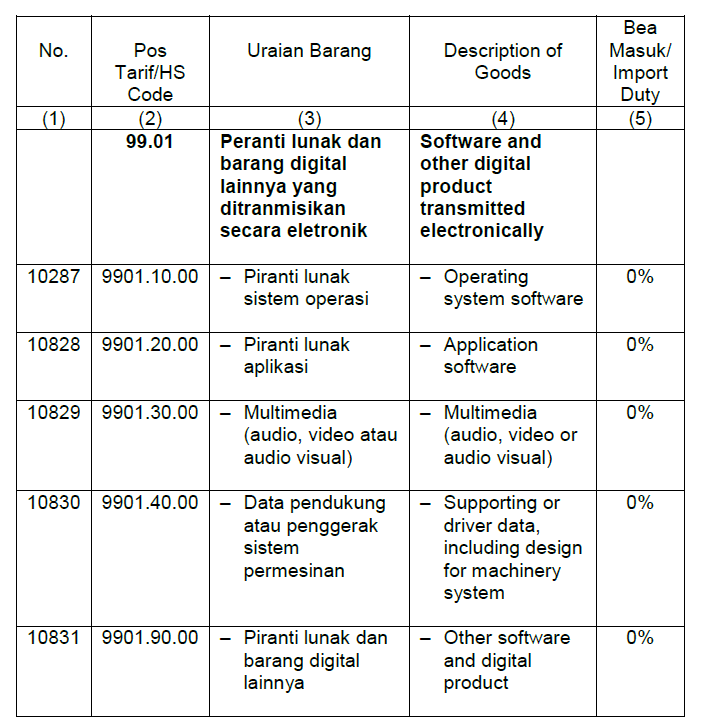11 March, 2018
On 15 February 2018, the Indonesian government issued Ministry of Finance Regulation No. 17/PMK.010/2018 on the Second Amendment of Regulation No. 6/PMK.010/2017 on Stipulation of Goods Classification System and Import Duty on Imported Goods (Regulation 17). Regulation 17 comes into effect 14 days after the enactment date, which means it is effective on 1 March 2018.
What is new in this Regulation 17?
Regulation 17 provides Chapter 99 as a new addition to the Indonesian tariff system as Chapter 98 had been the last chapter in the Indonesian Customs Tariff Book.
Chapter 99 covers intangible goods (ie, software and other digital products) that previously were not covered under the Indonesian tariff system. This is obviously a significant development in Indonesia.
Under Article 1 of Regulation 17, Chapter 99 consists of:
a. Chapter Note and Subheading Notes, as mentioned in Attachment I, as follow:
| Bab 99 Peranti Lunak dan Barang Digital Lainnya |
Chapter 99 Software and Other Digital Goods |
| Catatan
1. Peranti lunak dan barang digital lainnya yang ditransmisikan secara elektronik sebagaimana dimaksud dalam pos 99.01 adalah yang tidak terkait dengan mesin atau perangkat yang telah atau akan diimpor. 2. Peranti lunak dan barang digital lainnya yang ditransmisikan secara elektronik yang terkait mesin atau perangkat yang telah atau akan diimpor, diklasifikasikan bersama mesin atau perangkat tersebut. |
Notes
1. Software and other digital goods transmitted electronically referred to in heading 99.01 are those that are not related to machines or devices that have been or will be imported. 2. Software and other digital goods transmitted electronically related to machines or devices that have been or will be imported are classified with such machines or devices. |
| Catatan Subpos
1. Pos tarif 9901.40.00 hanya meliputi peranti lunak yang merupakan pembaharuan atau pemutakhiran peranti lunak untuk mesin atau perangkat yang telah diimpor sebelumnya. |
Subheading Notes
1. Tariff line 9901.40.00 covers only software that is a renewal or update of said software for machines or devices that have already been imported. |
b. products classification and import duty for software products and other digital goods that are transmitted electronically, as mentioned in Attachment II, as follow:
Please click on the table to enlarge.
Are intangible goods recognized for import?
Generally the concept of intangible goods as imported goods has been stipulated before the issuance of Regulation 17. While under the Indonesian Customs Law which was issued in 1995 and amended in 2006, "goods" are not defined, in 2014, Law No. 7 of 2014 on Trade ("Trade Law") defines Goods and Import as follows:
Goods: any object, whether tangible or intangible, moveable or immovable, that either can be spent or cannot be spent, that can be traded, used or utilized by consumers or business communities.
Import: activities of bringing Goods into the Indonesian customs area.
From the above definition, one can argue that intangible goods can be classified as "goods". Therefore, any intangible goods that are obtained from outside the Indonesian territory may be classified as "imported goods".
The enactment of Regulation 17 may also give rise to the question of whether it contradicts the WTO moratorium as we note that the WTO has decided to prolong the moratorium of e-commerce tax for developing countries.1 Further, the Ministry of Finance and Ministry of Trade have not yet issued a detailed regulation on e-commerce tax.2
What is next?
There are at least two big question marks in relation to this issue, ie, regarding:
Valuation System
From an import duty calculation perspective, there may not be any changes at this time as the import duty tariff for intangible goods is still 0%. However, the fact that there is already a 0% rate could to mean the intention of the government to push this matter through eg, to increase the state revenue.
Thus this also means that there is always a possibility that the government increases the duty rate anytime in the future. For now, at least we know that the Indonesia government takes intangible goods into consideration in the event of importation, which previously was not the case.
Another element that is worth considering is how to value the importation of these digital or intangible goods as there are no database to rely on. This may have an impact for least two years after the submission of the import declaration as under current Indonesian Customs Law, the customs authority can re-assess the customs value in a customs audit exercise within two years after import declaration.
Customs Declaration Concept
It appears to us, currently intangible goods can be interpreted broadly and open ended, to include any types of applications, software, video, audio, e-book etc. Customs declaration process and its supervision will obviously become a challenge.
There is a possibility that the Customs may implement a different approach in terms of the system in procuring and processing customs declaration such as (i) voluntary declaration, which then placing marketplace as the payment collectors; (ii) direct carrier billing, which reiterate on online payment method by way of reducing the credit of cellular phone; or (iii) payment gateway at the customs area.
We expect there will be more discussion on the impact of the issuance of Regulation 17 in the near future.
1 Govt wary of WTO’s trade rule, The Jakarta Post
2 BEA MASUK INTANGIBLE GOODS: Ini Strategi Ditjen Bea Cukai Awasi Barang Digital, Finansial; Kenakan Bea Masuk untuk E-Book Cs, Sri Mulyani Komunikasikan ke WTO, Okezone Finance; Pengenaan Bea Masuk Barang Tak Berwujud Terus Dikonsultasikan, Finansial
For further information, please contact:






